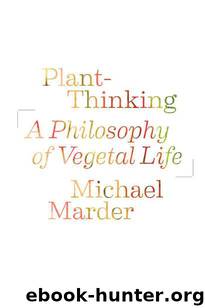Plant-Thinking: A Philosophy of Vegetal Life by Marder Michael

Author:Marder, Michael [Marder, Michael]
Language: eng
Format: epub
Published: 0101-01-01T00:00:00+00:00
PLANT-TIME (II): THE “BAD INFINITY” OF GROWTH
Vegetal time passes in qualitatively distinct modes and rhythms. In addition to hetero-temporality, the potentially infinite movements of growth and efflorescence further specify the time of plants (or more precisely, the meaning of this first temporal modality) as the way they tend to their other without measure, without limit, without term, and without ever reaching their final destination: “Thus, a mighty tree reaches the sky, dwells there, and extends itself without end [Ainsi, l’arbre puissant atteint le ciel, s’y installe, s’y prolonge sans fin].”18 Such monstrous growth and immoderate proliferation, whose possibilities are, stricto sensu, never realized, have always been unspeakably terrifying for philosophers, who in one way or another have busied themselves with, on the one hand, establishing the “proper limits” for desire, reason, life, or action, and, on the other, with setting up conceptual police authorities to safeguard these limits against potential transgressors. The plant’s “endless growth outwards,”19 its total externalization, the “infinite distances of the floral world [Unendliche Ferne der Blumenwelt],”20 and infinite temporality are anathema to the basic orientation of philosophy toward completion and perfection. Whenever a metaphysical philosopher speaks of plants at all, it is with the purpose of taming their proliferation and of appropriating their time, measuring it, and declaring it deficient in keeping with this measure alien to human beings.
Take vegetal desire, for instance. Whether or not the plant is a desiring being, it experiences no satisfaction when it exercises the only capacity of its soul for nourishment. In an already cited fragment of The Will to Power, Nietzsche calls the drive for nourishment, which is the epiphenomenon of the will to power, “insatiable,”21 while Novalis attributes to the life of plants an “uninterrupted eating and fecundation [ein unaufhörliches Essen und Befruchten].”22 Here both echo Hegel, who writes on the subject of the plant’s nutrition that “it is not an interrupted process but a continuous flow” and that “air and water are perpetually acting on the plant; it does not take sips of water.”23 Since the plant concentrates its entire being in the act of nourishment, it has no time to engage in other activities and therefore, on this view, it has no time at all. Time without a finite term, without spacings, ruptures, or terminations; time passing as a “continuous flow”; the time of nourishment without respite dissolves, like the very eternity it mimes, into pure space, even though it arises from the activity—the only activity—of the vegetal soul. The animal, in contrast to the plant, will gain time by virtue of the intricacy of its digestive system, which allows it gradually to expand energy and to be released from the constant attachment to the source of nourishment. No wonder then that one of the physiological features of the human being Hegel admires the most in Philosophy of Nature is the length of its digestive tract—directly proportional to the time of life freed from the exigencies of feeding! Beyond the kingdom of plants, dialectical time first
Download
This site does not store any files on its server. We only index and link to content provided by other sites. Please contact the content providers to delete copyright contents if any and email us, we'll remove relevant links or contents immediately.
| Anatomy | Animals |
| Bacteriology | Biochemistry |
| Bioelectricity | Bioinformatics |
| Biology | Biophysics |
| Biotechnology | Botany |
| Ecology | Genetics |
| Paleontology | Plants |
| Taxonomic Classification | Zoology |
Sapiens: A Brief History of Humankind by Yuval Noah Harari(13054)
The Tidewater Tales by John Barth(12030)
Do No Harm Stories of Life, Death and Brain Surgery by Henry Marsh(6337)
Mastermind: How to Think Like Sherlock Holmes by Maria Konnikova(6236)
The Thirst by Nesbo Jo(5786)
Why We Sleep: Unlocking the Power of Sleep and Dreams by Matthew Walker(5644)
Sapiens by Yuval Noah Harari(4537)
Life 3.0: Being Human in the Age of Artificial Intelligence by Tegmark Max(4509)
The Longevity Diet by Valter Longo(4446)
The Rules Do Not Apply by Ariel Levy(3906)
The Immortal Life of Henrietta Lacks by Rebecca Skloot(3826)
The Body: A Guide for Occupants by Bill Bryson(3802)
Why We Sleep by Matthew Walker(3773)
Animal Frequency by Melissa Alvarez(3755)
Yoga Anatomy by Kaminoff Leslie(3702)
Barron's AP Biology by Goldberg M.S. Deborah T(3632)
The Hacking of the American Mind by Robert H. Lustig(3580)
All Creatures Great and Small by James Herriot(3517)
Yoga Anatomy by Leslie Kaminoff & Amy Matthews(3396)
